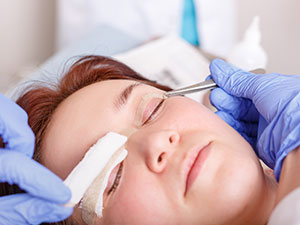Kathleen Broussard fell and fractured a bone in her eye socket. Dr. Thomas Cook, a craniofacial plastic surgeon, operated to repair the fracture. During surgery, Broussard’s lower eyelid was torn. She sued Dr. Cook and his surgical assistant for medical malpractice.
As Texas law requires, Broussard offered an expert report explaining why Dr. Cook breached the appropriate standard of care. Her expert, Dr. Peter Kastl, was a full-time professor of ophthalmology who performs and teaches ophthalmic surgical techniques. He has published more than one hundred articles in the field of ophthalmology.
Based on his examination of Broussard’s medical records, Dr. Kastl noted that Broussard’s lower lid was torn by a retractor. The surgical assistant was apparently holding the retractor while Dr. Cook was using a medical instrument that slipped from his grasp. Dr. Kastl opined that a torn eyelid is not a known complication of the surgery and could only have resulted from medical negligence.
Dr. Kastl explained that he is familiar with the type of surgery performed by Dr. Cook. He expressed the opinion that the standard of care “for a blowout fracture of the orbit is to repair the fracture without causing further injury to the patient.” That opinion seems self-evident, but Dr. Cook challenged Dr. Kastl’s qualifications to render it.
The trial court rejected the challenge and ruled that Dr. Kastl could testify at trial. Dr. Cook took an interlocutory appeal to the Texas Court of Appeals, which reversed the trial court’s decision.
Texas Law
Texas is one of many states that makes it more difficult to prove medical malpractice by limiting the range of experts who are allowed to testify about a physician’s standard of care. The law in those states requires judges to ignore the actual qualifications of the proposed expert and to apply an artificial test devised by the state legislature at the urging of medical industry lobbyists. That test often requires the expert to have recently practiced medicine in the same board-certified specialty as the allegedly negligent defendant.
Texas law is less strict. It requires an expert’s curriculum vitae to demonstrate that the expert: (1) is practicing medicine or was practicing when the claim arose; (2) has knowledge of accepted standards of medical care regarding the injury or condition involved in the claim; and (3) is “qualified on the basis of training or experience to offer an expert opinion regarding those accepted standards of medical care.”
A standard of care expert in Texas is qualified when the expert is “board certified or has other substantial training or experience in an area of medical practice relevant to the claim” and “is actively practicing medicine in rendering medical care services relevant to the claim.” An expert need not practice in the same specialty as the defendant to be qualified to offer an expert opinion. The question is “whether the expert’s expertise goes to the very matter on which he or she is to give an opinion.”
Appellate Court’s Analysis
Dr. Kastl has substantial training and experience regarding eye injuries and was actively practicing in the field of eye surgery. The question before the court was whether that training and experience qualified him to testify about a surgical standard of care when the surgery caused an eyelid injury.
The court of appeals relied on a Texas precedent that barred an anesthesiologist from testifying about the standard of care a surgeon should follow when inserting a stent and managing complications during heart surgery. The court decided that the anesthesiologist’s self-professed knowledge of the applicable standard of care was insufficient to demonstrate his expertise in heart surgery.
The court held that the anesthesiologist’s bare assertion of familiarity with a standard of care did not establish that his knowledge, skill, experience, training, or education qualified him to render an opinion about particular breaches of the standard of care applicable to a cardiologist dealing with complications arising from a surgical procedure. That decision is uncontroversial, given the difference between the medical procedures performed by an anesthesiologist and those performed by a heart surgeon.
Guided by that precedent, the court of appeals held that Dr. Kastl’s report failed to demonstrate that he had substantial training or experience in plastic surgery or other bone surgery. His training was in ophthalmology, a branch of medicine that focuses on the eye. While the surgery involved a bone in Broussard’s eye socket, the court held that the proximity of the eye socket to the eye “does not change the fact that this case concerns bone surgery, not eye surgery.”
That analysis would be more convincing if not for the fact that the injury to Broussard’s eyelid was caused by a retractor that was grasping the eyelid when the surgeon’s hand slipped. The training and experience of an ophthalmologist certainly includes the use of a retractor to hold an eyelid.
Dr. Kastl’s opinion that the injury resulted from an “inappropriate motion” by either the surgeon, the assistant who was holding the retractor, or both seems obvious. It should be equally obvious that slipping and causing an eyelid to tear defies any reasonable standard of care for a bone surgeon and the surgeon’s assistant. Disallowing Dr. Kastl’s opinion assures that an injury victim who had clear evidence of a medical team’s negligence will be denied compensation for her injury.
Perhaps Dr. Kastl’s report should have more clearly articulated his experience with retractors and eyelid injuries. The court of appeals concluded that Texas law prevents the court from inferring expertise. That rule, however, is another barrier that protects negligent doctors from the consequences of their malpractice while preventing injury victims from having a jury decide whether an expert with relevant medical knowledge is qualified to render a standard of care opinion.




